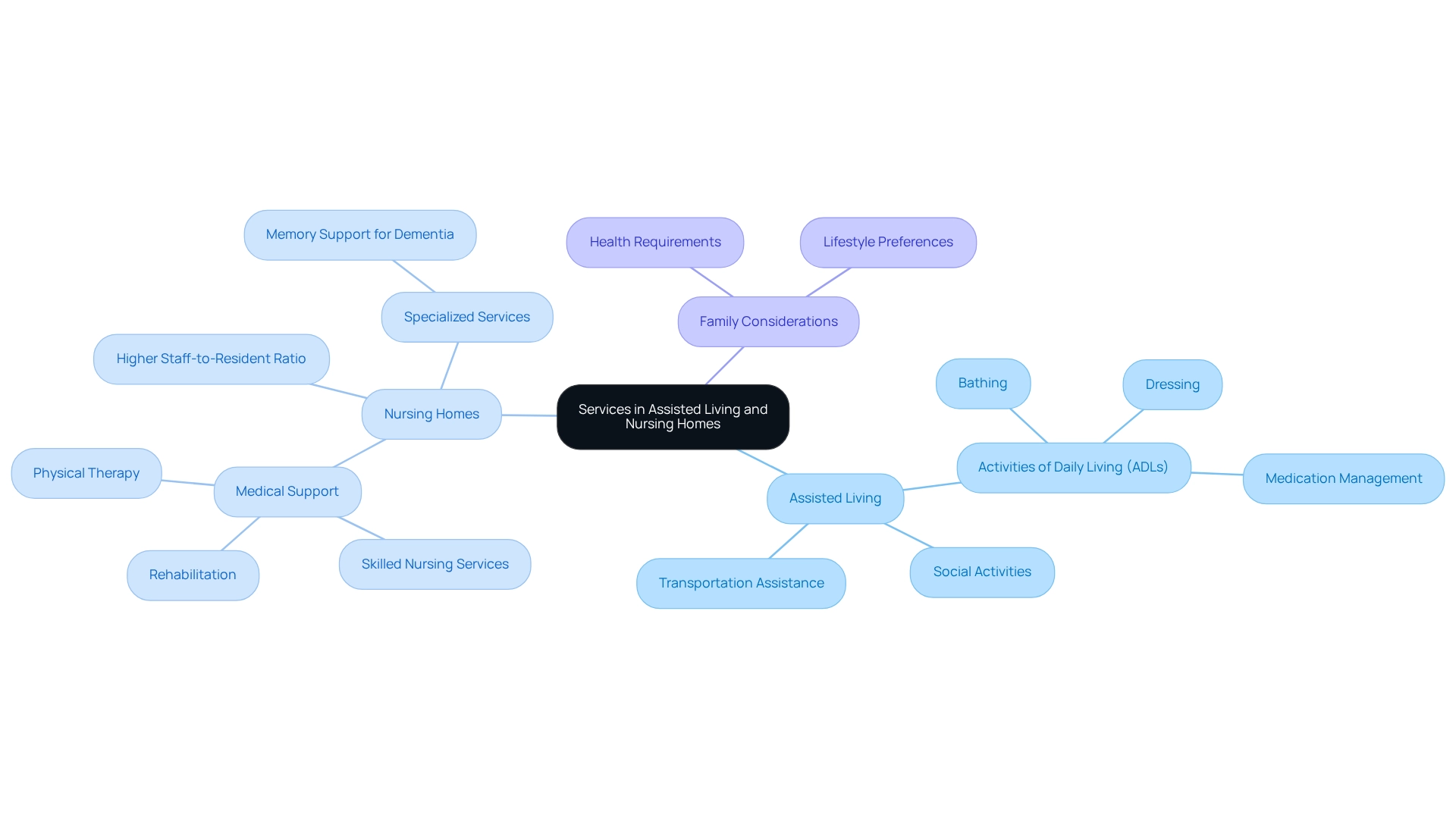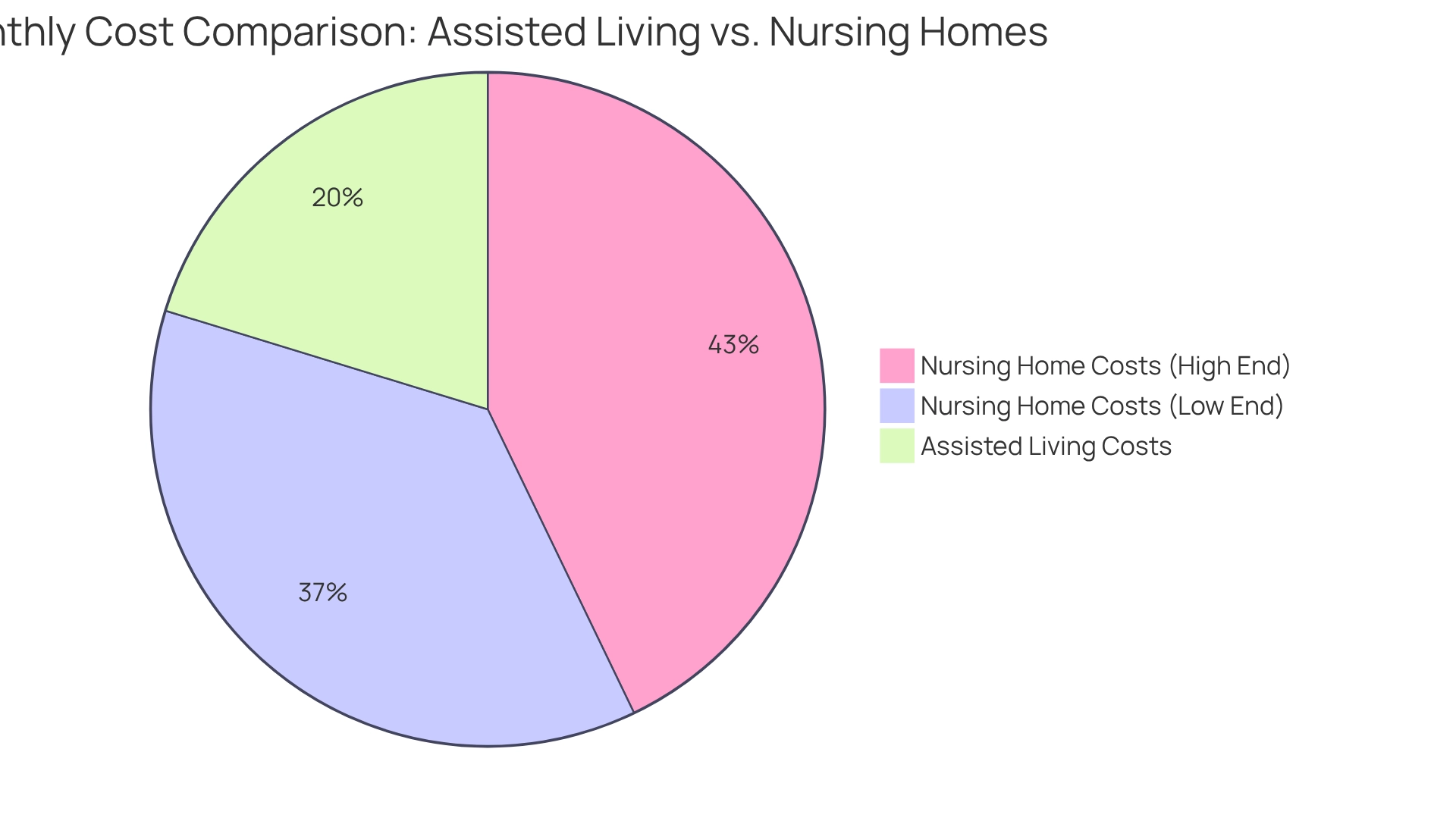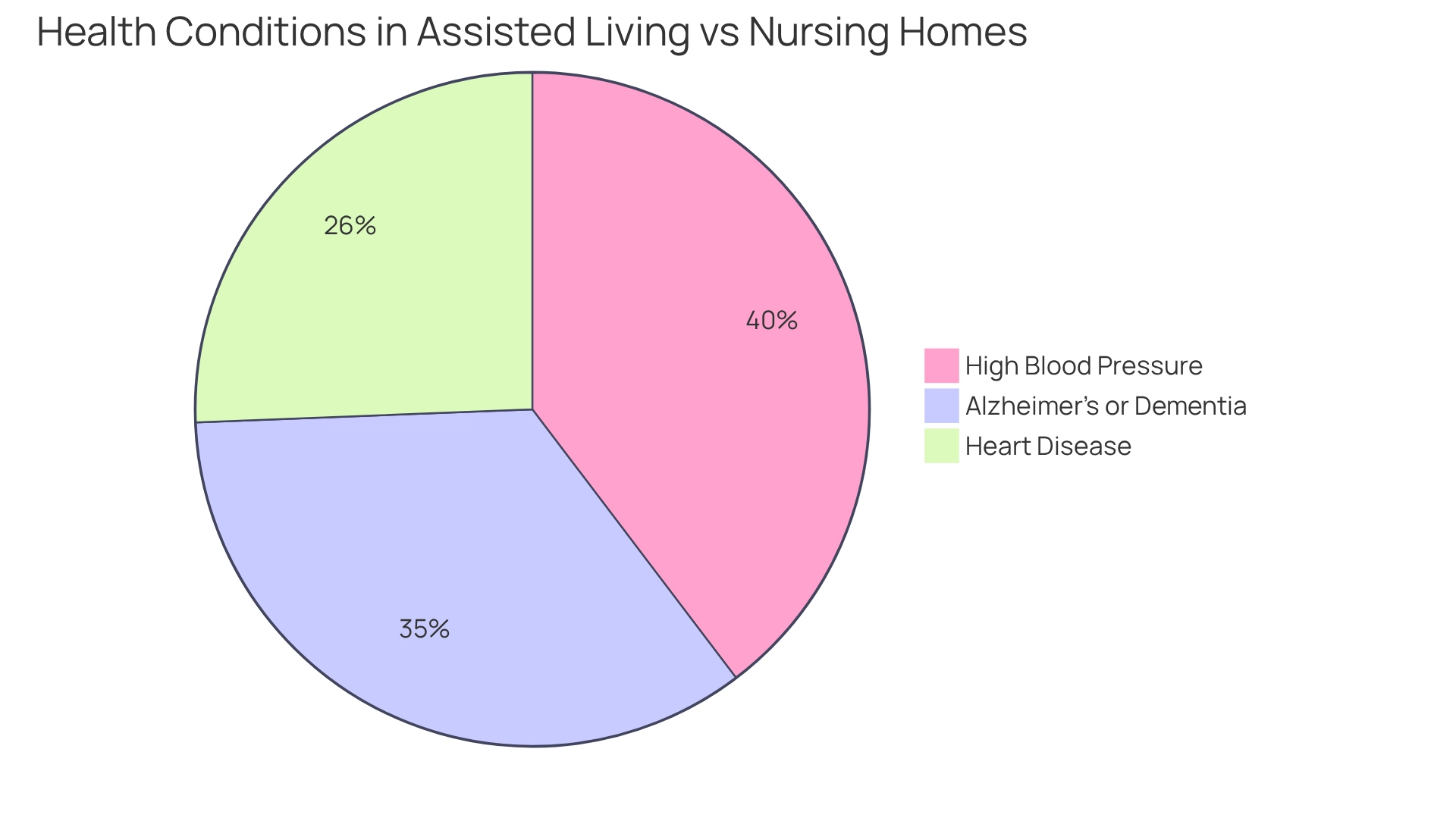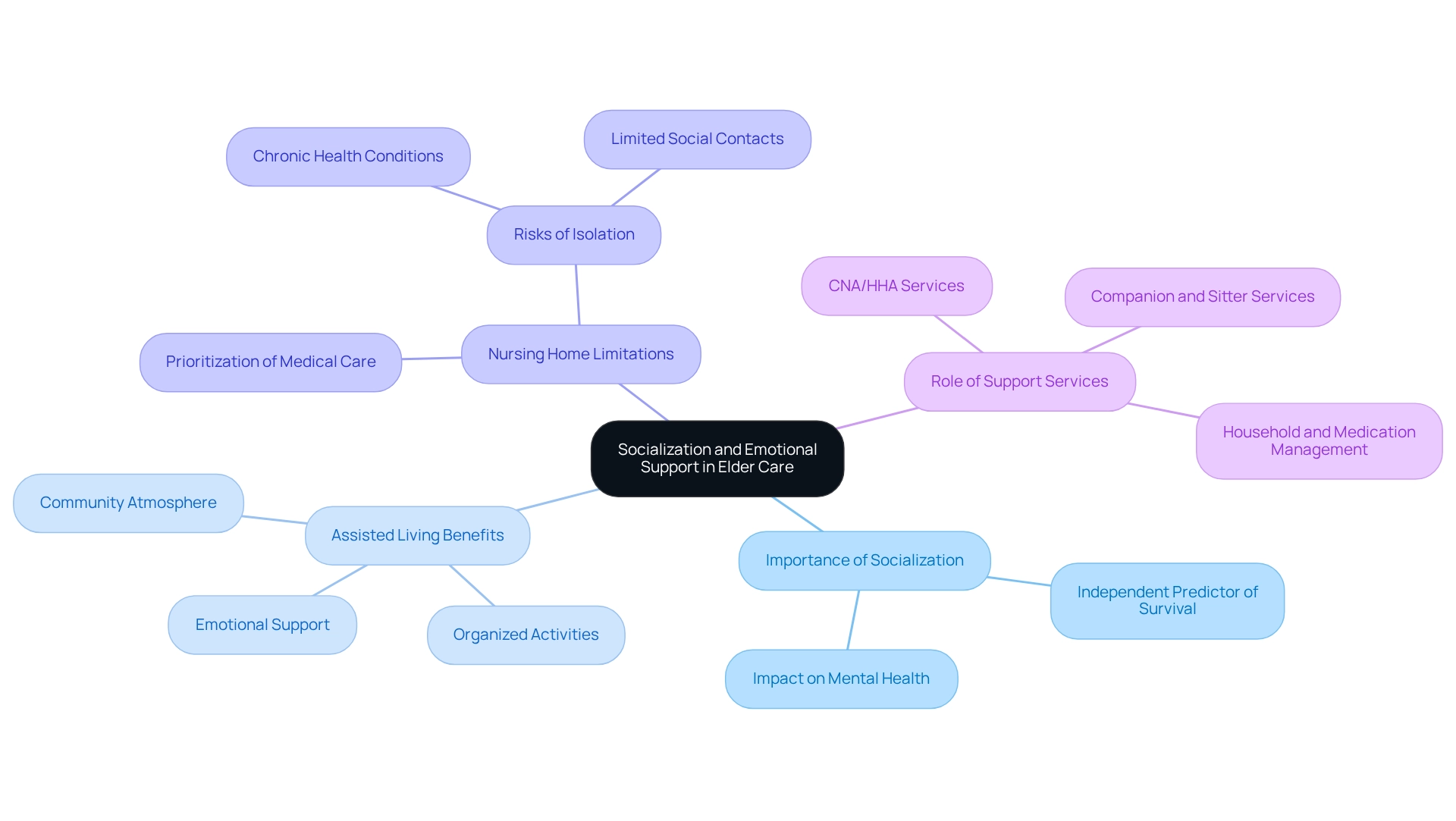Overview
This article thoughtfully compares assisted living and nursing homes, recognizing the importance of understanding your loved ones’ needs. Assisted living facilities provide a more independent lifestyle, offering essential support for daily activities, which can be comforting for those seeking a balance of autonomy and care. In contrast, nursing homes deliver extensive medical care for individuals facing chronic health issues, ensuring they receive the attention they require.
As you explore these options, consider the varying levels of care, costs, and lifestyle implications associated with each choice. It’s crucial to align care decisions with the specific needs and preferences of elderly individuals, ensuring they feel valued and supported. Remember, your loved one’s comfort is our priority, and we’re here to help guide you through this important journey.
Introduction
Navigating the complex landscape of senior care can feel overwhelming for families seeking the best options for their loved ones. As our senior population continues to grow, understanding the differences between assisted living facilities and nursing homes becomes increasingly important.
Assisted living provides a supportive environment that encourages independence while offering assistance with daily activities. In contrast, nursing homes deliver a higher level of medical care for individuals with chronic health conditions requiring constant supervision.
As families consider their options, it’s essential to reflect not only on the level of care needed but also on the emotional, social, and financial implications of each choice. This article explores the nuances of assisted living and nursing homes, offering valuable insights to help families make informed decisions that align with their loved ones’ needs and preferences.
Remember, we’re here for you, and your comfort is our priority.
Understanding the Basics: Assisted Living vs Nursing Homes
Assisted living and nursing home facilities cater to elderly individuals who need help with daily tasks while still valuing their independence. These environments typically offer private or semi-private apartments, communal dining areas, and a variety of social activities that foster community engagement. In contrast, nursing homes are specifically designed for individuals with chronic illnesses or disabilities that require constant medical supervision and care.
In nursing homes, residents often share spaces and have limited control over their living arrangements, which may feel less intimate compared to the more homely atmosphere of assisted living.
The advantages of assisted living are significant, especially in promoting a sense of autonomy among residents. Approximately 70% of people aged 65 and older will require some form of long-term assistance throughout their lives, with an average duration of three years. This statistic underscores the importance of preparing for long-term care needs, as many seniors prefer settings that allow them to maintain their independence while receiving essential support.
Recent data indicates that Florida ranks second in the nation for the number of supportive care communities, with around 2,400 facilities available to serve its elderly population. This growing number of facilities reflects a crucial trend toward assisted living options, providing a higher level of medical assistance while often compromising personal freedom. By 2025, a significant proportion of older adults are expected to occupy supportive housing, further demonstrating this shift.
Experts emphasize that supportive housing is not merely about providing assistance; it is about enhancing the quality of life for older adults. As gerontologist Mary McDonald Winners, founder of About Seniors Solutions, states, “Long-term care is care for an individual that helps with grooming, bathing, dressing, eating, and other tasks throughout the day.” This perspective reinforces the idea that care facilities are designed to support older adults in a way that respects their desire for autonomy while ensuring they receive the help they need.
Additionally, services such as assistance with activities of daily living (ADLs) and meal plans are often included in the monthly rate, which typically covers most amenities, making assisted living a comprehensive option for many families.
Best Care Nurses Registry proudly serves cities including Miami, Fort Lauderdale, and Boca Raton, offering personalized assistance to local elderly individuals and their families. Our CNA/HHA services play a vital role in enhancing seniors’ health and quality of life, ensuring they receive tailored support that fosters independence and emotional well-being. With our flexible support options, families can find peace of mind knowing their loved ones are safe and happy at home.
Services Provided: What to Expect in Assisted Living and Nursing Homes
In supportive housing environments, often categorized under assisted living versus nursing homes, residents typically receive assistance with activities of daily living (ADLs), which include essential tasks such as bathing, dressing, and medication management. These facilities are thoughtfully designed to encourage independence while offering a variety of services, including social activities, nutritious meals, and transportation assistance. This nurturing environment promotes social interaction and community involvement, both vital for the well-being of seniors.
In contrast, the differences between assisted living and nursing homes are clear. Nursing homes provide a higher level of medical support for individuals with more complex health needs. They offer skilled nursing services, physical therapy, and rehabilitation, ensuring that residents receive comprehensive medical attention. The staff-to-resident ratio in nursing facilities is typically greater, allowing for more individualized support and careful oversight of health conditions.
Both supportive housing and nursing homes may offer specialized services, such as memory support for residents with dementia. However, the level of medical assistance is significantly higher in nursing facilities, highlighting the differences in care when considering assisted living versus nursing homes for individuals requiring continuous medical oversight.
As the elder population continues to grow, with estimates suggesting that around 7 out of 10 individuals will need support such as assisted living or nursing home care at some point in their lives, understanding these distinctions becomes increasingly important. Families should thoughtfully consider the specific needs of their loved ones when choosing between assisted living and nursing home options, ensuring they select an environment that aligns with their health requirements and lifestyle preferences.
Best Care Nurses Registry exemplifies the evolving landscape of elder living by providing tailored services and adaptability that meet individual needs. Their private duty RNs and LPNs offer affordable, convenient home health care options, ensuring that older adults receive the essential support necessary to maintain their independence and quality of life. The registry’s commitment to matching clients with appropriate caregivers is achieved through a thorough evaluation process that considers both the needs of the elderly and the capabilities of the caregivers.
Additionally, the provision of 24/7 nurse access guarantees that elderly individuals have continuous support and immediate assistance when necessary, enhancing their safety and peace of mind. This approach not only addresses safety and convenience but also offers crucial emotional support, helping to alleviate feelings of isolation and improve overall well-being for seniors and their families. Recognizing the risks faced by seniors without CNA/HHA services, such as health decline and social isolation, underscores the importance of professional caregiving for an improved quality of life.
As families navigate these choices, acknowledging the need for companion and sitter services becomes essential in fostering independence and ensuring a safe environment.

Cost Comparison: Evaluating Financial Implications of Care Options
In 2025, the typical monthly expense of assisted living compared to nursing homes is projected to be approximately $5,676. This is considerably less than the monthly costs of nursing home services, which range from $10,326 to $12,000. This difference in costs is influenced by factors such as the level of assistance needed and geographic location. Assisted housing options often provide a more cost-effective choice for families seeking to meet support needs while maintaining financial stability.
Many of these facilities offer flexible payment plans and do not require long-term contracts, which can significantly ease the financial burden on families. Furthermore, around 47% of pharmacies provide long-term support services to senior housing facilities, further enhancing the supportive environment for residents. In contrast, nursing homes typically require a higher financial commitment due to the comprehensive medical services they offer. This makes it essential for families to carefully consider their options.
Financial planning is crucial, as not everyone allocates sufficient funds for elderly support. Understanding these expenses can greatly impact long-term assistance choices. Leslie Fuller, a Licensed Master Social Worker and Certified Dementia Practitioner, emphasizes the importance of thorough financial planning in elderly support. She states, ‘It’s crucial for families to comprehend the complete range of expenses associated with both assisted living and nursing home options to make informed choices.’ Additionally, with ongoing staffing challenges in support communities—evidenced by a turnover rate of 41.1% in 2022—families must weigh the quality of service against financial implications when deciding between assisted living and nursing home options.
The high turnover rates and reported staff shortages in assisted housing facilities highlight the necessity for families to evaluate not only the expenses but also the standard of support when making their choices. Remember, your comfort and peace of mind are our priorities, and we are here to support you through this important decision.

Levels of Care: Assessing the Support Available in Each Facility
When comparing assisted living to nursing homes, it’s essential to recognize that assisted living centers are designed to provide a tiered approach to support. This structure allows residents to receive varying degrees of assistance tailored to their personal needs. This flexibility is particularly beneficial for those who are more self-sufficient, while also accommodating residents with chronic conditions who may require more extensive support. In contrast, nursing homes provide a consistent level of care, including 24-hour supervision and medical assistance, which is crucial for residents facing complex health issues that necessitate ongoing monitoring and intervention.
As of 2023, statistics show that the average length of stay in assisted living communities is approximately 27 months, with a median stay of 22 months, according to the case study titled “Length of Stay in Assisted Living and Nursing Homes.” This stands in stark contrast to nursing homes, where the median stay is only about 5 months, highlighting a critical transition phase for many seniors. Notably, individuals are, on average, 83 years old when entering a nursing home, providing important context regarding the demographics of nursing home residents.
Families must carefully evaluate their loved one’s health condition and specific support needs to determine the most appropriate environment.
Furthermore, the tiered support approach in assisted living facilities allows for a more personalized experience, as residents can receive enhanced assistance as their needs evolve. The role of CNA/HHA caregiver services is crucial in this context, as they provide personalized assistance that enhances the quality of life and independence of elderly individuals. These services address health declines, inadequate nutrition, hygiene issues, and mobility challenges, ensuring that older adults maintain their dignity and well-being.
Without CNA/HHA services, elderly individuals may face significant challenges such as health decline, social isolation, and difficulties in managing daily activities, potentially leading to further complications.
Healthcare experts emphasize the importance of understanding these tiers of care. Assisted living can offer a more flexible solution for individuals who may not yet require the extensive care available in nursing facilities. As Amanda McGrory-Dixon, Content Marketing Manager at Aline, states, “Aline provides a comprehensive solution to navigate the changing environment of elder care, assisting operators in enhancing performance, increasing revenue growth, and remaining competitive in the market.” Ultimately, the decision between assisted living and nursing homes should be guided by the person’s health needs and the level of oversight required to ensure their safety and well-being.
At Best Care Nurses Registry, we are committed to providing the necessary support and services to enhance the quality of life for seniors and their families, ensuring that your comfort is our priority.
Lifestyle and Environment: Comparing Daily Life in Assisted Living vs Nursing Homes
Individuals in supportive housing often experience a vibrant and interactive lifestyle, filled with opportunities for social interaction, leisure activities, and community gatherings. These environments prioritize independence and personal choice, allowing residents to maintain a sense of autonomy that is vital for their well-being. For instance, studies show that:
- 48% of residents in assisted living versus nursing home facilities manage high blood pressure
- 42% face challenges related to Alzheimer’s disease or other forms of dementia
- 31% have heart disease
This underscores the necessity for supportive yet flexible care options that encourage active living. When comparing assisted living to nursing homes, the latter typically presents a more structured environment primarily focused on medical care. While activities are available, the predominant emphasis on health and safety may limit social interactions and personal freedom, potentially affecting the overall quality of life for residents. This distinction is crucial, as many families seek environments that align with their loved one’s preferences for involvement and lifestyle when making choices between assisted living and nursing homes.
The role of CNA/HHA services is essential in both settings, as these caregivers provide personalized support that enhances older adults’ health and overall quality of life. Assistance with daily activities such as meal preparation, personal hygiene, and medication management can prevent health declines and foster well-being. Additionally, emotional support from caregivers alleviates feelings of loneliness and depression, positively impacting mental health.
Without these services, seniors might face health deterioration, inadequate nutrition, hygiene issues, and social isolation, which can significantly impact their quality of life.
Expert opinions highlight the importance of community involvement in supportive residential environments. Gerontologists frequently point out that the social activities available in assisted living versus nursing home facilities contribute positively to resident satisfaction rates, which tend to be higher than those in traditional nursing homes. For example, a case study revealed that individuals in supportive housing often participate in organized outings, fitness classes, and arts and crafts, fostering a sense of belonging and purpose.
Furthermore, most households manage care expenses through personal finances, which is an important consideration for those evaluating their options. Ultimately, families must thoughtfully assess how each setting, including assisted living versus nursing homes, aligns with their loved one’s lifestyle and preferences. The lifestyle statistics indicate that support facilities not only meet health needs but also enhance the overall experience, making them an appealing choice for many individuals seeking care.
Additionally, the median expense of a one-bedroom assisted accommodation was noted at $4,803 in 2023, highlighting the importance of understanding financial implications when selecting an assisted community. Best Care Nurses Registry is here to provide the necessary CNA/HHA services to meet these essential needs.

Socialization and Emotional Support: The Human Element of Care
Socialization plays a vital role in the well-being of older adults, significantly impacting their mental health and overall quality of life. Assisted living facilities, unlike nursing homes, are designed to cultivate a community atmosphere, encouraging residents to engage with one another through a variety of organized activities, outings, and communal dining experiences. This environment not only fosters friendships but also provides essential emotional support, crucial for maintaining mental health.
Research indicates that participation in social activities is an independent predictor of overall survival among older adults, underscoring the importance of social engagement in these settings. Customized assistance services, like those offered by CNA/HHA providers, can enhance this experience by delivering personalized support that meets individual requirements. This ensures that elderly individuals preserve their independence and dignity while enjoying a higher quality of life. As noted by Ebadi A. (Ph.D.), “We would like to express our sincere gratitude to the University of Social Welfare and Rehabilitation Sciences,” highlighting the importance of research in understanding these dynamics.
In contrast, nursing homes often prioritize medical care, which can inadvertently limit opportunities for social interaction. While many nursing homes do offer structured social activities, the rigid nature of their environment may restrict spontaneous interactions among residents. A case study on the risk factors of social isolation for older adults reveals that age, chronic health conditions, and limited social contacts contribute to increased vulnerability to loneliness, which is notably higher in assisted living compared to nursing home settings.
This isolation can lead to severe consequences, including heightened risks of dementia, heart disease, and even premature death. The Elderly Activity Inventory Questionnaire has been used in various studies to assess social activities, providing a quantitative basis for understanding the impact of socialization on health outcomes.
Moreover, without CNA/HHA services, older adults may encounter significant challenges such as health declines, poor nutrition, hygiene issues, and mobility challenges. These factors can exacerbate their overall health and well-being. Expert opinions further reinforce the importance of emotional support in elder care.
Psychologists emphasize that emotional well-being is closely tied to social connections. Programs designed to enhance emotional support in nursing homes can significantly improve residents’ mental health outcomes. Examples of such programs include group therapy sessions, pet therapy, and regular social events that encourage interaction among residents. Furthermore, companion and sitter services can offer essential assistance for older adults, helping to reduce feelings of loneliness and ensuring that they receive the social interaction necessary for their emotional well-being.
Caregiver services also aid with household management and medication management, which are essential for sustaining a safe and healthy environment. Families contemplating assistance options for their loved ones should thoroughly assess how assisted living versus nursing home environments meet emotional and social needs. These elements are vital to guaranteeing a rewarding and healthy life for seniors. It is important to note that the research is observational and cannot establish causation, nor account for changes in socializing or health behaviors over time.

Choosing the Right Fit: Factors to Consider for Your Loved One’s Care
Choosing the right support option for your loved one is a deeply personal decision that requires thoughtful evaluation of several factors in the context of assisted living versus nursing homes. Families should begin by assessing the individual’s health status, level of independence, and personal preferences. Key indicators that may suggest the need for CNA or HHA caregiver services include difficulties with personal hygiene, dressing, cooking, cleaning, or managing medications.
CNAs (Certified Nursing Assistants) typically undergo more comprehensive training focused on medical procedures, such as measuring vital signs and administering medications. In contrast, HHAs (Home Health Aides) emphasize personal assistance and daily activities. Understanding the specific services offered by each facility is crucial, as these can vary significantly. For instance, assisted living communities often foster a homely atmosphere that encourages autonomy, while nursing homes typically provide more intensive medical care and oversight.
Financial implications are another critical aspect to consider. Many families prioritize the costs associated with care decisions, making it essential to explore funding options like long-term care insurance. Best Care Nurses Registry accepts most Long Term Care insurances directly on your behalf, which can significantly influence the decision between assisted living and nursing homes.
However, it is important to note that Medicare does not cover activities of daily care provided by private duty caregivers, which are essential for many seniors.
The Assignment of Benefits (AOB) process allows policyholders to direct their insurance carriers to pay Best Care directly for services rendered. This can simplify the payment process, as Best Care will handle the necessary paperwork and follow up with the insurance provider. Families should understand that while AOBs are accepted, they remain responsible for any unpaid portions of the bill if the insurance does not cover the full amount.
Recent studies, including one conducted using electronic health records from the Mayo Clinic with 808 participants, emphasize the importance of advance care planning in support facilities. This study found that residents are more likely to have advance directives compared to those living in the community. Yet, over 30% of support facility residents still lack any form of advance directive, highlighting a gap in end-of-life planning that families should address.
As Paul Y. Takahashi, MD, emphasizes, “Advance planning for health is essential for ensuring that individuals’ wishes are respected and that families are prepared for future medical decisions.”
Furthermore, a 10 percent increase in assisted living capacity is linked to a 0.2 percent rise in the NCMI score and a 0.6 percent rise in the ADL score. This indicates that greater capacity can lead to enhanced quality of service and improved resident outcomes.
Visiting potential facilities is invaluable. Families should engage with staff, observe interactions among residents, and assess the overall atmosphere. Such visits can provide insights into the quality of assistance and the community environment, helping families determine which option aligns best with their loved one’s needs.
Consistent interaction with caregivers and home support agencies is also vital to ensure high-quality assistance.
In summary, assessing care choices for the elderly, including the options of assisted living versus nursing homes, requires a holistic approach that considers health, independence, financial implications, and the quality of the facility. By thoughtfully considering these factors, families can make informed decisions that best support their loved one’s wellbeing.
Key Takeaways: Making an Informed Decision Between Assisted Living and Nursing Homes
Understanding the differences between assisted living and nursing home facilities is essential for families, as these options cater to distinct needs and preferences among seniors. Assisted living facilities are designed for individuals who cherish a degree of independence while still requiring some support with daily activities. These settings typically offer a variety of services, such as personal assistance, meal preparation, and social activities, fostering a community atmosphere that encourages involvement and well-being.
Conversely, nursing facilities provide a higher level of medical attention and oversight, making them suitable for individuals with serious health concerns or those recovering from surgery. Residents in nursing homes often need round-the-clock assistance from skilled nursing staff, which is crucial for managing chronic conditions or complex medical needs. Statistics reveal that women typically remain in long-term living facilities for an average of 3.7 years, while men average 2.2 years, highlighting the differing durations of stay based on personal health situations.
Moreover, individuals aged 31 to 64 account for approximately 7% of long-term assistance recipients, showcasing the diverse demographic of those needing support.
When considering options for elderly support, families should take various factors into account, such as the specific services available, related expenses, and the overall lifestyle effects of each choice. For instance, assisted living versus nursing home options might be more economical for individuals who do not require significant medical attention, whereas nursing homes may involve higher costs due to the quality of support provided. In 2020, public and governmental entities represented 60.4% of all national expenditures on long-term support, according to Claire Samuels, emphasizing the financial aspects families must navigate.
Key indicators for assessing the need for senior home assistance include difficulty with daily activities, memory problems, or emerging health issues. Families often seek reliable caregivers, considering factors like experience, qualifications, and the ability to provide tailored support plans. At Best Care Nurses Registry, we emphasize the importance of matching families with caregivers who possess the necessary qualifications and experience to deliver dependable assistance.
Resources such as the Eldercare Locator and Medicare’s Care Compare tool can aid families in finding suitable long-term assistance options, ensuring they make informed choices. Case studies illustrate that families who actively engage in the decision-making process often discover solutions that closely align with their loved ones’ needs, enhancing their quality of life. Additionally, it is vital to recognize that end-of-life support requires emotional and physical assistance for both the individuals and their family members, which can influence the decision regarding assisted living versus nursing home care.
At Best Care Nurses Registry, we invite families to call (888) 203-2529 to discuss with our compassionate staff about developing a customized home health solution that addresses your loved one’s specific needs. During the initial assessment, we will explore your loved one’s unique requirements and preferences, allowing us to create a personalized care plan that reflects their individual needs. By weighing the benefits and limitations of each option, families can ensure their decisions align with the individual’s health requirements and personal preferences, leading to a more fulfilling and supportive living arrangement.
Conclusion
Understanding the differences between assisted living facilities and nursing homes is crucial for families navigating senior care options. Assisted living promotes independence while providing essential support with daily activities, fostering a vibrant community atmosphere that encourages socialization and emotional well-being. In contrast, nursing homes cater to individuals with significant medical needs, offering a higher level of care and constant supervision, which can sometimes limit personal freedoms.
As families consider these options, it’s imperative to evaluate the unique needs of their loved ones, including health status, lifestyle preferences, and financial implications. The cost disparities between assisted living and nursing homes further underscore the importance of thorough financial planning, as assisted living often presents a more budget-friendly alternative without compromising quality of care.
Ultimately, selecting the right fit involves a holistic approach that considers the individual’s health requirements, desired level of independence, and the overall environment of the facility. By engaging in thoughtful discussions and assessments, families can make informed decisions that enhance their loved ones’ quality of life, ensuring they receive the appropriate care in a supportive and nurturing setting.
As the senior population continues to grow, understanding these distinctions will empower families to choose wisely, prioritizing both health and happiness for their loved ones. Remember, we’re here for you—your comfort is our priority as you navigate these important decisions.
Frequently Asked Questions
What is the difference between assisted living and nursing homes?
Assisted living facilities cater to elderly individuals who need help with daily tasks while valuing their independence, offering private or semi-private apartments and communal activities. Nursing homes are designed for those with chronic illnesses or disabilities requiring constant medical supervision and care, often providing a higher level of medical support.
What types of services are typically offered in assisted living facilities?
Assisted living facilities usually provide assistance with activities of daily living (ADLs) such as bathing, dressing, and medication management, along with social activities, nutritious meals, and transportation assistance.
How do nursing homes differ in terms of medical support?
Nursing homes offer a higher level of medical support for individuals with complex health needs, including skilled nursing services, physical therapy, and rehabilitation. They typically have a greater staff-to-resident ratio for individualized support and careful health oversight.
What percentage of older adults are expected to require long-term assistance?
Approximately 70% of people aged 65 and older will require some form of long-term assistance throughout their lives, with an average duration of three years.
What is the current trend regarding supportive care communities in Florida?
Florida ranks second in the nation for the number of supportive care communities, with around 2,400 facilities available, reflecting a growing trend toward assisted living options for the elderly population.
What role do supportive housing environments play in enhancing the quality of life for seniors?
Supportive housing environments are designed to encourage independence while providing essential assistance and promoting social interaction and community involvement, which are vital for seniors’ well-being.
How do families determine the best care option for their loved ones?
Families should consider the specific health requirements and lifestyle preferences of their loved ones when choosing between assisted living and nursing home options, ensuring the selected environment aligns with their needs.
What additional services might be available for seniors in need of care?
Both assisted living and nursing homes may offer specialized services such as memory support for residents with dementia, as well as companion and sitter services to foster independence and ensure a safe environment.











